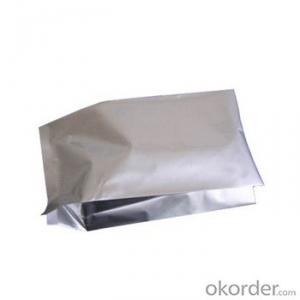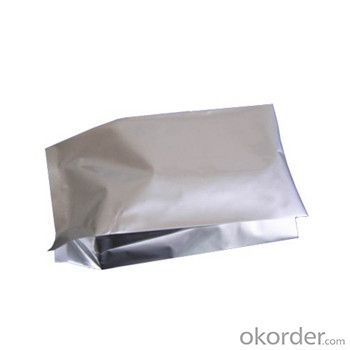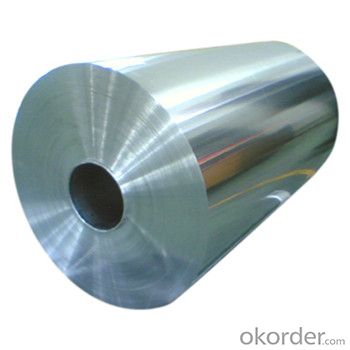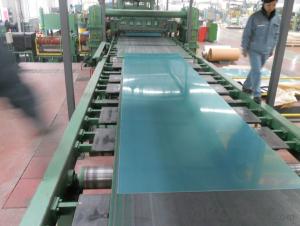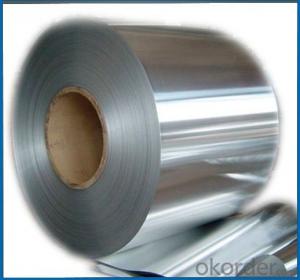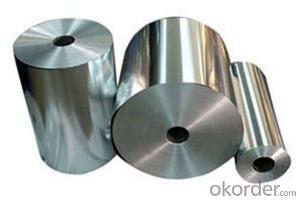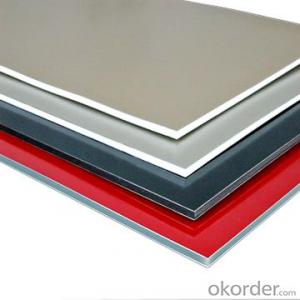Aluminium Jumbo Foil For Flexible Packaging Application
- Loading Port:
- China main port
- Payment Terms:
- TT OR LC
- Min Order Qty:
- 3 m.t
- Supply Capability:
- 10000 m.t/month
OKorder Service Pledge
OKorder Financial Service
You Might Also Like
Item specifice
1. Description of Aluminium Jumbo Foil For Flexible Packaging Application
Aluminum foil aluminum alloy :1235 /8011/8079
Aluminum foil width and length :according to your request
Aluminum foil Core ID :76.2mm &152mm
Aluminum foil temper : o /h12 / h24
Final usage: insulation aluminum foil / lidding aluminum foil /tag and lable aluminum foil / container aluminum foil / food and pharmaceutical packing foil / cigarette aluminum foil
2. Specifications of Aluminium Jumbo Foil For Flexible Packaging Application
Product | Alloy | Thickness | Width | ID mm | Remark |
| Cable wrap foil | 1235/8011-O | 0.2-2.0mm | 60-1700mm | 76 152 200 300 400 500 | Accept customization |
| Bottle cap foil | 8011-H14/H16 | ||||
| Household foil | 1235/8011-O | 0.005-0.2mm | 100-1700mm | ||
| Container foil | 3003-H24/ 8011-H24 | ||||
| Flexible packingfoil | 1100/1235/8011-O | ||||
| Lable foil | 8011-O |
3. Feature of Aluminium Jumbo Foil For Flexible Packaging Application
*Such coil is specially designed to replace aluminum ingot, due to the high export tax of aluminum ingot, the coil has better price than ingot.
*This type of coil can fit customer's remelting furnace just like ingot, no need to make any change to the production line that was previously used for ingot. The standard coil size and weight is very suitable for the feed gate of furnace.
*This type of coil causes less material wastage than ingot when remelted.
*Our coil is made directly from ore, no need to go though the ingot making process, quality is much better than other suppliers who use ingot scrap to make coil.
Be free from Oil Stain, Dent, Inclusion, Scratches, Stain, Oxide Dicoloration, Breaks, Corrosion, Roll Marks, Dirt Streaks and other defect which will interfere with use
4. Certificate:
SGS and ROHS(if client request, paid by client), MTC(plant provided), Certificate of Origin(FORM A, FORM E, CO), Bureau Veritas and SGS (if client request, paid by client), CIQS certificate
5. Image of Aluminium Jumbo Foil For Flexible Packaging Application
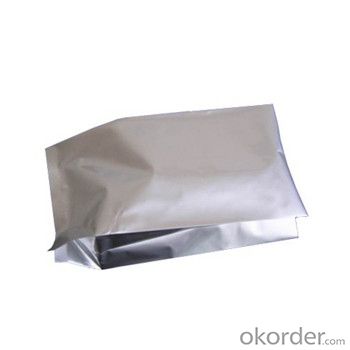
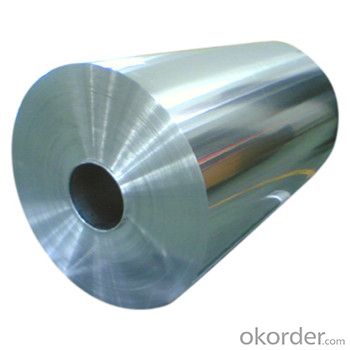
6. Package and shipping of Aluminium Jumbo Foil For Flexible Packaging Application
eye to sky
eye to wall
with wooden pallet (wooden case also available)
7. FAQ
1) What is the delivery time?
Dpends on actual order, around 20 days
2) What is the QC system:
We have QC staff of 20 persons and advanced equipment, each production is with MTC traced from Aluminum ingot lot.
3) What market do you mainly sell to?
Australia, America, Asia, Middle East, Western Europe, Africa etc
- Q:Can aluminum coils be used in automotive applications?
- Yes, aluminum coils can be used in automotive applications. Aluminum coils are lightweight, which makes them an excellent choice for automotive manufacturers as it helps to reduce the overall weight of the vehicle. This, in turn, can improve fuel efficiency and performance. Additionally, aluminum coils have excellent heat conductivity, which is crucial in automotive applications where heat dissipation is important. Moreover, aluminum coils have good corrosion resistance, which is particularly beneficial in automotive applications where vehicles are exposed to various weather conditions and road salts. Overall, the use of aluminum coils in automotive applications can provide several advantages such as weight reduction, improved fuel efficiency, better heat dissipation, and enhanced corrosion resistance.
- Q:What are the fire resistance properties of aluminum coils?
- Due to its unique characteristics, aluminum coils possess excellent fire resistance properties. This is primarily attributed to the metal's high melting point of 660 degrees Celsius (1220 degrees Fahrenheit), enabling it to endure high temperatures without deforming or melting. Moreover, when exposed to air, aluminum forms a thin layer of oxide on its surface. This oxide layer acts as a protective barrier against fire and prevents further oxidation. It is worth noting that this oxide layer possesses a high melting point and is non-combustible, making it an effective fire retardant. Another advantage of aluminum is its poor heat conductivity. Consequently, it does not readily transfer heat during a fire, thus slowing down the spread of flames. As a result, aluminum coils are extensively utilized in various applications where fire resistance is a vital requirement, such as building construction, transportation, and electrical wiring.
- Q:How do aluminum coils compare to other materials in terms of strength?
- Aluminum coils are known for their remarkable strength-to-weight ratio, making them highly competitive compared to other materials. While aluminum may not be as strong as certain metals like steel or titanium, it still possesses sufficient strength to meet the demands of various applications. The specific strength of aluminum coils refers to their strength relative to their weight, which is often superior to other materials. Additionally, aluminum coils offer exceptional corrosion resistance, which further enhances their durability and longevity. Although there may be stronger materials available, aluminum coils remain an excellent choice for many industries due to their favorable strength characteristics and numerous other benefits.
- Q:Who knows about how much money can be sold in a three metre high similar aluminum door?
- How wide is it, mainly to see the door you have multiple components, scrap is generally about 10 yuan a kilogram!
- Q:Are there any specific regulations for the transportation of aluminum coils?
- The transportation of aluminum coils is subject to specific regulations aimed at guaranteeing their safe handling and transport in order to prevent any accidents or damage. These regulations encompass various key requirements: 1. Packaging: To avoid any shifting, damage, or falling during transportation, aluminum coils must be securely packaged in appropriate containers. This may involve the utilization of strapping, banding, or shrink-wrapping techniques. 2. Weight limitations: Depending on the mode of transportation employed, there are weight restrictions in place for the transportation of aluminum coils. These limitations are implemented to ensure the stability and safety of the vehicle during transit. 3. Loading and unloading procedures: It is essential to follow proper loading and unloading procedures to minimize the risk of coil damage and to ensure worker safety. This may necessitate the use of specialized equipment like cranes or forklifts. 4. Regulations for hazardous materials: In certain instances, aluminum coils may be considered hazardous materials due to their flammability or other characteristics. In such cases, additional regulations and requirements may be applicable, such as appropriate labeling, documentation, and handling procedures. 5. Transportation permits: Depending on the size, weight, and destination of the aluminum coils, specific permits or licenses may be necessary for their transportation. These permits ensure compliance with local, state, and federal regulations. It is crucial for companies involved in the transportation of aluminum coils to possess awareness of and adhere to these regulations to ensure the secure and efficient transport of the coils. Failure to comply with these regulations can result in fines, penalties, or even legal ramifications.
- Q:Can aluminum coils be used in high-altitude environments?
- Yes, aluminum coils can be used in high-altitude environments. Aluminum is a lightweight and corrosion-resistant material, making it suitable for various applications, including in high-altitude environments. Aluminum coils are commonly used in air conditioning systems, heat exchangers, and refrigeration units, which can function efficiently at high altitudes. Aluminum's high strength-to-weight ratio allows it to withstand the extreme conditions found at high altitudes, including low temperatures, high winds, and low atmospheric pressure. Additionally, aluminum is non-magnetic, which is advantageous in certain high-altitude applications, such as aerospace and satellite technologies. Furthermore, aluminum has excellent thermal conductivity, allowing it to efficiently transfer heat, making it ideal for use in cooling systems operating in high-altitude environments. Its corrosion resistance properties also make it durable and able to withstand the effects of moisture, which can be prevalent in such environments. Overall, aluminum coils are a reliable and suitable choice for use in high-altitude environments due to their lightweight, corrosion resistance, thermal conductivity, and strength.
- Q:How do aluminum coils compare to galvanized steel coils in terms of longevity?
- Compared to galvanized steel coils, aluminum coils typically have a longer lifespan when it comes to longevity. Aluminum is naturally resistant to corrosion, meaning it is less prone to rust or deterioration over time. As a result, aluminum coils are widely chosen for outdoor purposes, including roofing, siding, and HVAC systems, as they can endure harsh weather conditions while maintaining their structural integrity. In contrast, galvanized steel coils are coils made of steel that are coated with a layer of zinc as a protective measure against corrosion. Although this zinc coating offers some degree of protection, it can eventually wear away, especially in areas with high humidity or exposure to saltwater. Once the zinc coating is compromised, the underlying steel becomes vulnerable to rust and corrosion, significantly diminishing the lifespan of galvanized steel coils. Consequently, if longevity is a primary concern, aluminum coils are typically a more resilient and enduring option compared to galvanized steel coils. Nevertheless, it is crucial to take into account other factors such as cost, specific application requirements, and maintenance needs before reaching a final decision.
- Q:How do aluminum coils contribute to lightweight transportation?
- Aluminum coils contribute to lightweight transportation by providing a lighter alternative to traditional materials like steel. Due to its low density and high strength-to-weight ratio, aluminum is used to manufacture various components in transportation vehicles, including coils for heating and cooling systems. The use of aluminum coils reduces the overall weight of the vehicle, resulting in improved fuel efficiency and reduced emissions.
- Q:Are the currently rentable U-Haul trailers or trucks made out of aluminum or fiberglass? Thanks!
- most of them are aluminum
- Q:Can aluminum coils be used in automotive suspension systems?
- Yes, aluminum coils can be used in automotive suspension systems. Aluminum is a lightweight and durable material that offers several advantages for suspension components. It has a high strength-to-weight ratio, which means that it can handle heavy loads without adding unnecessary weight to the vehicle. This can result in improved fuel efficiency and overall performance. Additionally, aluminum is resistant to corrosion, which is especially important for automotive suspension systems that are exposed to harsh weather conditions and road debris. By using aluminum coils, manufacturers can ensure that the suspension components will last longer and require less maintenance. Furthermore, aluminum coils have the ability to absorb and dissipate heat more efficiently than other materials, such as steel. This can help prevent overheating and reduce the risk of suspension failure, particularly during intense driving conditions or off-road use. However, it is worth noting that the use of aluminum coils in automotive suspension systems may come with certain trade-offs. While aluminum is lighter and more resistant to corrosion, it may not be as strong as steel. Therefore, manufacturers must carefully design and engineer the suspension system to ensure it can withstand the necessary loads and provide adequate support and stability for the vehicle. In summary, aluminum coils can indeed be used in automotive suspension systems, offering benefits such as lightweight construction, corrosion resistance, and efficient heat dissipation. However, it is crucial for manufacturers to consider the specific requirements and trade-offs associated with using aluminum in suspension components to ensure optimal performance and safety.
1. Manufacturer Overview |
|
|---|---|
| Location | |
| Year Established | |
| Annual Output Value | |
| Main Markets | |
| Company Certifications | |
2. Manufacturer Certificates |
|
|---|---|
| a) Certification Name | |
| Range | |
| Reference | |
| Validity Period | |
3. Manufacturer Capability |
|
|---|---|
| a)Trade Capacity | |
| Nearest Port | |
| Export Percentage | |
| No.of Employees in Trade Department | |
| Language Spoken: | |
| b)Factory Information | |
| Factory Size: | |
| No. of Production Lines | |
| Contract Manufacturing | |
| Product Price Range | |
Send your message to us
Aluminium Jumbo Foil For Flexible Packaging Application
- Loading Port:
- China main port
- Payment Terms:
- TT OR LC
- Min Order Qty:
- 3 m.t
- Supply Capability:
- 10000 m.t/month
OKorder Service Pledge
OKorder Financial Service
Similar products
New products
Hot products
Hot Searches
Related keywords
